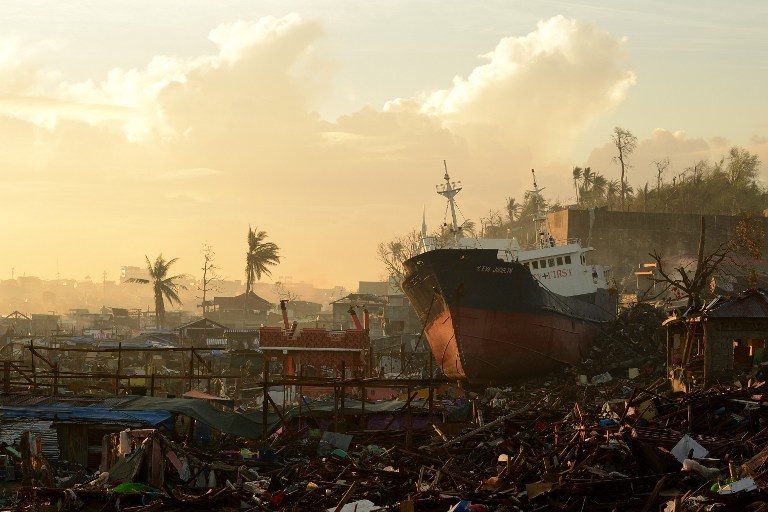SUMMARY
This is AI generated summarization, which may have errors. For context, always refer to the full article.

One year ago, Typhoon Haiyan (known locally as Yolanda) struck the Philippines, claiming over 6,000 lives. In the aftermath, numerous reports emerged regarding the failure of the Philippine government to properly manage relief efforts and get foreign aid to victims.
This past September, the Philippine Commission on Audit (COA) released its comprehensive – and damning – Report on the Audit of Typhoon Yolanda Relief Operations. According to the report, of the $15 million available in the Office of Civil Defense (OCD) quick response fund, and the $1 million in donations received by the National Disaster Risk Reduction Management Council (NDRRMC), not one cent was spent on the basic subsistence needs of typhoon victims, in clear violation of the statutory mandate of Republic Act 10352.
Elizabeth Loftus’s recent post highlighted some of the challenges involved in fighting corruption in a conflict zone. While a natural disaster like Typhoon Haiyan poses similar issues, the challenges–and the opportunities for effective response–differ in some important respects.
On the one hand, in a natural disaster – as in a conflict situation – the chaos and breakdown of oversight, coupled with the dependence of victims on the resources, coordination, and capabilities of those in a position to provide relief creates a power imbalance that increases opportunities for corrupt actors.
At the same time, although any individual natural disaster is unpredictable, the fact that such disasters will periodically occur is predictable (at least in certain disaster-prone areas), and this creates opportunities–which perhaps don’t exist to the same degree in the context of armed conflicts–to plan ahead: to take steps that can redress the potential power imbalance before the crisis occurs.
The need to plan ahead to address corruption in natural disaster response is critical because, in the immediate aftermath of something like a typhoon strike, normal governmental operations grind to a halt, and the immediate needs of disaster management override the government’s interest in strict oversight of resource allocation. The breakdown of accountability provides unscrupulous public officials with a golden opportunity to siphon off money and supplies from government funds and donations.
Moreover, because the responsibility for natural disaster response falls mainly on the government, public officials placed in charge of relief operations are given a heightened opportunity to exploit victim desperation in order to advance their private interests. (In this regard, the corruption risks may be even more severe than in the armed conflict situations that Elizabeth described, where the corrupt actors are mostly NGOs and their local clients.)
The aftermath of Typhoon Haiyan illustrates the potential for abuse: As foreign aid began pouring in to the hardest hit regions, reports emerged that village captains – who had been put in charge of coordinating the distribution of relief goods – were distributing relief packs and vouchers on the basis of favoritism and political patronage. In one town, a mayor was accused of distributing goods only to affiliates of his own party.
Again, the emergency situation would have made it difficult for enforcement agencies to investigate or prosecute these officials while relief efforts were ongoing. But governments in disaster-prone areas can and should take measures to address these problems both before and after a natural disaster strikes:
- Enforcement agencies should impose increased costs upon officials who exploit the disaster for personal gain. Investigations into the misuse of relief goods should become routine after every major disaster, as should prosecution of implicated officials. Investigations and prosecutions should focus not only on stolen funding, but also on acts of extortion, hoarding, or unequal treatment of victims. Media should also play a role in deterring corrupt behavior by increasing public attention on prosecution of corrupt officials, even if it continues well beyond the immediate aftermath of the disaster.
- Reporting mechanisms should also be ramped up. In isolated regions, military personnel could be charged with delivering reports to national anticorruption agencies based on the accounts of victims and aid workers. Anticorruption agencies could also remain in disaster-struck regions after immediate relief efforts to receive complaints from survivors when they are no longer reliant on distributed goods.
- Advanced planning should focus on reducing the discretion of local officials. Shifts could be made to bolster the capabilities of national disaster management bodies, rather than reserving funds away that cannot be touched until disaster strikes. The recent COA report demonstrates how such funds can go misused amidst the chaos. Some of this funding could go toward building up infrastructure, investing in regional offices designed to manage or oversee equitable distribution of relief goods, and reinforcing communication structures so that media can maintain access during the disaster itself.
These few suggestions are certainly easier said than done, but they are meant to highlight that fighting corruption in the context of environmental disasters need not be confined to the disaster itself.
In regions like the Philippines, where such catastrophes are, unfortunately, a recurring event, it’s important that anticorruption efforts take a long-term approach, and make clear that corrupt actions will not go unnoticed once the dust settles. – Rappler.com
 Beatriz Paterno is a second year J.D. candidate at Harvard Law School. At Harvard, she is a contributor for the Global Anticorruption Blog, which is devoted to providing analysis and discussion of corruption around the world. She is particularly interested in issues affecting the Philippines, where she lived for much of her life before moving to the US for college.
Beatriz Paterno is a second year J.D. candidate at Harvard Law School. At Harvard, she is a contributor for the Global Anticorruption Blog, which is devoted to providing analysis and discussion of corruption around the world. She is particularly interested in issues affecting the Philippines, where she lived for much of her life before moving to the US for college.
This article was written for the Global Anticorruption Blog, a Harvard Law School affiliated project. The blog is intended to foster debate and encourage the exchange of ideas on the topic of corruption.
For Rappler’s full coverage of the 1st anniversary of Super Typhoon Yolanda (Haiyan), go to this page.
Add a comment
How does this make you feel?
There are no comments yet. Add your comment to start the conversation.